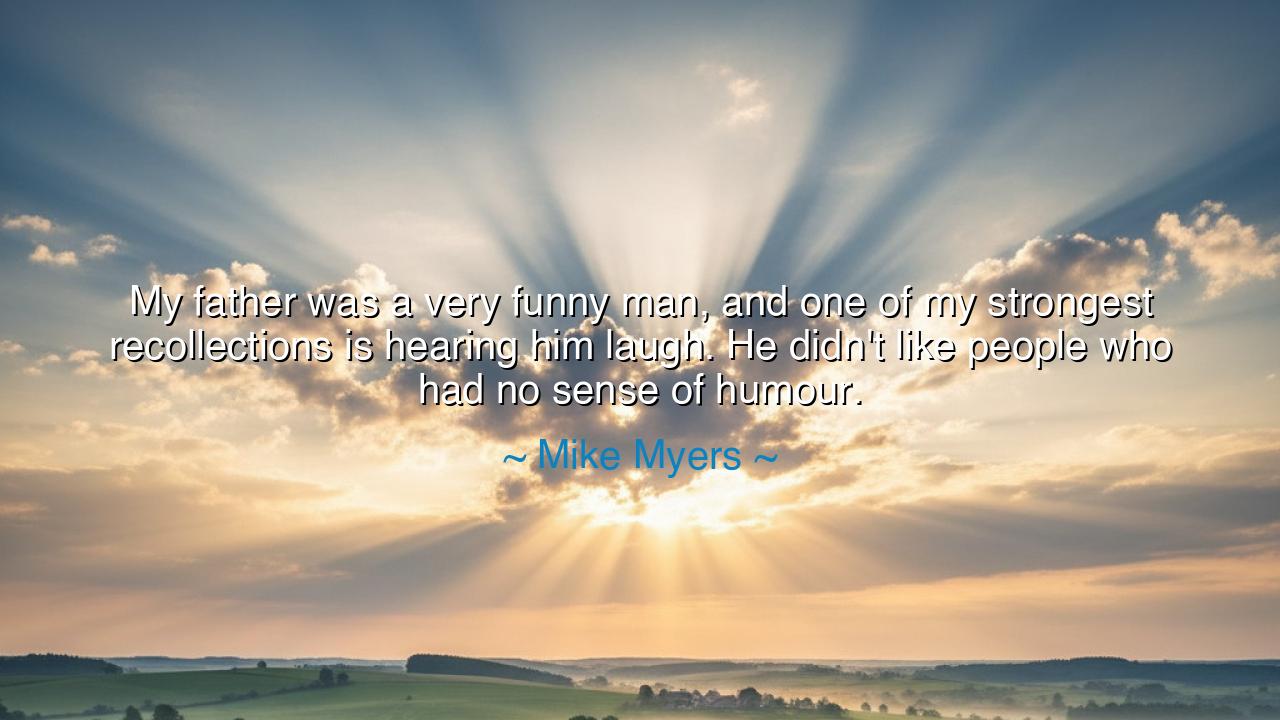
My father was a very funny man, and one of my strongest
My father was a very funny man, and one of my strongest recollections is hearing him laugh. He didn't like people who had no sense of humour.






In the words of Mike Myers, “My father was a very funny man, and one of my strongest recollections is hearing him laugh. He didn’t like people who had no sense of humour.” — there lies a tender and eternal truth: that laughter is not mere sound, but spirit. It is the echo of life’s defiance against sorrow, the soul’s rebellion against despair. Myers speaks not only of his father, but of all who carry light within them — those who understand that humour is not an escape from reality, but a way to embrace it with courage and grace.
In every age, the wise have known that the heart that can laugh is the heart that can endure. The ancient philosophers said that laughter was the soul’s way of remembering that it is larger than its pain. To laugh is to declare, “I will not be conquered by suffering.” Thus, when Myers remembers his father’s laughter, he recalls not just joy, but strength — a man who met the absurdities of the world with the sword of wit and the shield of mirth. Such men are rare and noble, for they teach others that even in darkness, there is warmth to be found.
The sense of humour that his father cherished was not mere jest or idle play. It was a form of wisdom, a recognition of life’s paradoxes. Those who possess it are like sailors who laugh at the storm, knowing that laughter steadies the hand upon the wheel. And those who lack it — those whom his father “didn’t like” — are not hated for their solemnity, but pitied for their blindness. For a man without humour is a man without perspective; he cannot see beyond his own shadow. He mistakes seriousness for depth, and pride for dignity. Yet humour, when born of love, is the truest sign of depth — for only one who understands pain can truly laugh without cruelty.
In the history of the world, we find many who carried such laughter as a torch through suffering. Consider Abraham Lincoln, who, even in the darkest hours of civil war, disarmed despair with gentle wit. When critics called him simple, he smiled and said, “Better to be thought simple than to be cruel.” His laughter was not mockery, but mercy — a way to bind wounds that reason could not heal. Like Myers’s father, Lincoln’s humour was born from compassion, not arrogance. It was a bridge between hearts in a time when all bridges burned.
The origin of this wisdom lies in the sacred truth that laughter and love spring from the same well. To laugh with others is to acknowledge their humanity; it is to say, “I see your struggle, and I choose to share it lightly.” Myers’s memory of his father laughing is thus not small or sentimental — it is holy. It is the remembrance of a man whose spirit refused to be hardened, who used laughter not as escape but as connection. In his laughter lived the power of healing — for when a father laughs, the world feels safe to the child who hears him.
The lesson in these words is clear: cultivate humour as you would cultivate faith. Do not let the world’s burdens silence your laughter. When life grows cruel, find within yourself the courage to smile — not because everything is well, but because you still have the strength to hope. The wise do not laugh because life is easy; they laugh because they have seen enough to know it is precious.
Therefore, my friends, learn to laugh as an act of love. Laugh at your own mistakes, and they will no longer chain you. Laugh with others, and you will share in their humanity. Laugh even through tears, for that is when laughter is purest — the kind that rises not from the lips but from the soul. Remember that the gods themselves, according to ancient myth, laughed when they created the world, for creation is the child of joy.
So when you next hear laughter — yours or another’s — pause and honour it. For in that moment, you hear eternity speaking softly through the mortal heart. Mike Myers’s father understood this divine mystery: that humour is not merely a gift, but a grace. And when his son remembers that laughter, it is not just memory — it is inheritance. Let us all, then, strive to pass on that same inheritance — a spirit unbroken, a heart that laughs, and a life that, in its joy, redeems the world.






AAdministratorAdministrator
Welcome, honored guests. Please leave a comment, we will respond soon